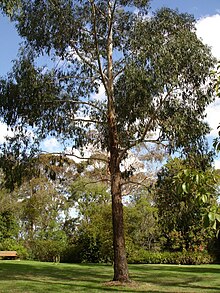Eucalyptus ovata
| Eucalyptus ovata | |
|---|---|
 |
|
| Eucalyptus ovata | |
| Scientific classification | |
| Kingdom: | Plantae |
| (unranked): | Angiosperms |
| (unranked): | Eudicots |
| (unranked): | Rosids |
| Order: | Myrtales |
| Family: | Myrtaceae |
| Genus: | Eucalyptus |
| Species: | E. ovata |
| Binomial name | |
|
Eucalyptus ovata Labill. |
|
 |
|
| E. ovata, field distribution | |
Eucalyptus ovata, commonly known as Swamp Gum or Black Gum, is a widespread occurring Australian eucalypt. The species was first described in 1806 by Jacques Labillardière in Novae Hollandiae plantarum specimen. The locality given in that work is "in terrâ Van-Leuwin", indicating Southwest Australia, but the species does not occur in that region.
The swamp gum is a small to medium-sized tree, rarely a mallee, with bark that sheds over most of the trunk revealing a smooth, grey, whitish or pinkish-grey surface. The rough bark is retained at the base on larger trees. Leaves are stalked, broad lanceolate, undulate to 19 x 8.5 cm dull and green. White flowers appear in autumn to mid-winter. It can reach a height of 30 metres. It is variable in habit from straggly saplings (in east Gippsland) to stout boled trees.
The tree is widespread from the western end of Kangaroo Island, the southern Mount Lofty ranges and the south-east of South Australia, Tasmania, the southern part of Victoria and south-eastern New South Wales, preferring valleys and poorly drained flat areas.
...
Wikipedia
